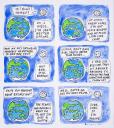«Who speaks for Earth?»
 If there’s one thing that has plagued or doomed all human civilisations, it their blatant ignorance during the time in which they prosper. But if you look back on some former civilisations, history reveals they only made relatively minor mistakes (as far as their long-term survival was concerned).
If there’s one thing that has plagued or doomed all human civilisations, it their blatant ignorance during the time in which they prosper. But if you look back on some former civilisations, history reveals they only made relatively minor mistakes (as far as their long-term survival was concerned).
It’s no secret that most people in today’s advanced societies live greedy, unsustainble lives. We directly contribute to the destruction of the planet, and we’re under the false impression that things will never change. When something as simple and uncontrolable as the weather bites back, we’re stunned. Speechless, until the moment we are able to forget and resume our old ways…
The trouble with our society is this: we are well aware that we change the environment on a «small scale». For example, we build roads & cities. We cause local deforrestation. We pollute rivers. So we can see clearly enough that what we are doing also affects the surrounding ecosystem negatively. But then when we move up to thinking about the global scale, our thought patterns are no longer logical. But many of us simply do not accept that our home, the entire planet Earth, is in jeopardy. We either quickly change the subject, ignore it altogether, or go into a major case of denial. It’s a problem of scale, which our puny minds cannot yet comprehend.
So I put this to my readers: if we can accept that we as a society are changing things on a local scale, and we can also grasp the fact that humans now populate every single country (albeit some regions denser than others), why can’t we accept the inevitable conclusion that we are also collectively changing the entire face of the Earth, on the global scale?
With respect to this planet, our home, we’re making multiple, simultaneous and erroneous choices: we intentionally modify the surface of the planet; we permantly remove vast areas of natural land; we cut down the trees which supply us with the very air we breathe; we mine this Earth for minerals and smelt them to provide for our own selfish consumer desires. While our population skyrockets, we increase production and consumption, producing further air, sea and soil pollution. We resort to burning fossil fuels to provide us with our insatiable energy quest.
Are we really that *stupid* that we think there are not going to be any major repercussions? Do we really think we can transform everything synthetically and expel gases without limits – and these effects won’t be felt, globally? We claim this is the age of information, so we really should know better. Like I say, we’re going to seem extemely stupid, ignorant, greedy or lazy (or a combination of the above) in the future (if not now already).
Sometimes I am convinced that we are collectively fucked as a civilisation. Due to simple «social pressures» we are too cowardly too change. It’s commonly said for example that we’re a social species. So we’ll die as such. There’s also the problem of scale, as discussed previously. We are probably clever enough to fix our own mess before it gets out of hand (or we were), but we’re instinctively too afraid to change our modern ways. We are well aware of this extreme reluctance already and we’re even more reluctant when we think about it… yes… sometimes I think it’s hopeless… that we’re doomed already.
The only constant is change, continuing change, inevitable change, that is the dominant factor in society today. No sensible decision can be made any longer without taking into account not only the world as it is, but the world as it will be. — Isaac Asimov
If there’s one thing that science has taught me, its that nature has a tendancy to re-assert itself. We are not as strong or smart as we think, because we utterly depend on this planet for our own survival. I wonder how far we would get elsewhere without any Earth-bound aid? So as we destroy it, planet Earth, we also destroy ourselves.
Personally I think it is wiser to act now, today, than suffer the inevitable worsening consequences later. Because no one promised us that things would never change. No one said to us: «Earthlings, we guarantee that the composition of oxygen in the thin atmospheric layer around your world will remain at a constant composition of 20.9%, for all eternity». In reality, the composition of oxygen and CO2 for example are dynamic values; there’s nothing stopping them from fluctuating or changing permanently, like they have in the past.
I sometimes wonder if we could actually see the oxygen being sucked into all those internal combustion engines as cars drive by, if it was tinted bright red for example, I wonder whether we would feel differently if we could see it disappearing in front of our very own eyes. Would we take it for granted so much then?
Yes some bright spark is bound to point out that trees replenish the current oxygen level through photosynthesis, although I fail to see how their dwindling numbers will cope with ever-incerasing urbanisation in future. Governments currently do not take the work of trees into account in their national budgets, because all plants perform this task for free. Regardless, I’m sure some ‘smart’ people are already thinking of a synthetically derived alternative for them: Oxy-generation units. In turn, I pose the following questions: Even if it was economically viable, would this kind of ‘solution’ be as efficient at producing oxygen as a self-generating, naturally occuring forrest? Maybe. Has the environmental cost of such a large-scale operation been fully studied and have the long-term consequences also been taken into account? Doubtful. Would an artificial it be as beautiful or indeed as inspirational as the humble forrest? Impossible.
It has taken an unthinkable amount of time for the air to become what it is today. Billions of years, if that means anything to you. I don’t need to divulge that Earth’s initial enironment contained a host of toxic gases and little oxygen. Nor that there was also no ocean present. Instead, I speculate about the following: what natural forces prevent the Earth from regressing to its former inhospitable state? We might have the power to control the environment, to override those natural forces, but we’ll most likely thwart the process of evolution by perhaps 100 million years as a result. The severity of future change is in our hands.
Some argue that we shouldn’t be too alarmist. That we’re entering another natural ice age. But we don’t appear to just influence these ‘natural cycles’, we drastically precipitate them! These epochs should take tens of thousands of years to initiate, not merely decades. I’m sure the response will come that «the data isn’t reliable enough to come to that conclusion», or some other nonsense. To those people, I say the following: wake up and look around. Don’t just look around the room. Move outside of your comfort zone and look to the cosmos, all that is. You will see that oxygen is rare. Water is rarer still. And the cold vacuum of deep space is omnipresent. If that thought isn’t enough to chill you to the bone, you are in the wrong place.





Discussion Area - Leave a Comment